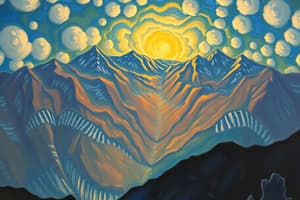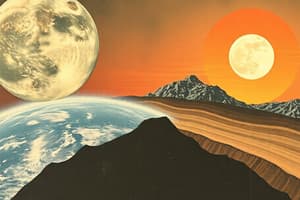Podcast
Questions and Answers
What is the primary location where new oceanic crust is created?
What is the primary location where new oceanic crust is created?
- Subduction zones
- Transform boundaries
- Mid-ocean ridges (correct)
- Continental-continental convergent boundaries
Which location is characterized by volcanic activity that caused the devastating 2004 Indian Ocean tsunami?
Which location is characterized by volcanic activity that caused the devastating 2004 Indian Ocean tsunami?
- The Mariana Trench
- The Sunda Plate (correct)
- The Andes Mountains
- The Himalayas
What is the primary characteristic of a location where two continental plates converge?
What is the primary characteristic of a location where two continental plates converge?
- Formation of volcanic islands
- Formation of fold mountains (correct)
- Formation of mid-ocean ridges
- Formation of deep trenches
What is the name of the layer of the atmosphere that contains the ozone layer?
What is the name of the layer of the atmosphere that contains the ozone layer?
What is the uppermost layer of soil called?
What is the uppermost layer of soil called?
Flashcards
Location of New Oceanic Crust
Location of New Oceanic Crust
New oceanic crust is formed at mid-ocean ridges where tectonic plates diverge.
Subduction Zone
Subduction Zone
An area where oceanic crust slides under continental crust, leading to volcanic activity.
Layers of the Atmosphere
Layers of the Atmosphere
The atmosphere consists of several layers, each with different properties and phenomena.
El Niño Event
El Niño Event
Signup and view all the flashcards
Watershed
Watershed
Signup and view all the flashcards
Study Notes
Plate Tectonics
- Oceanic Crust Formation: New oceanic crust is created at mid-ocean ridges.
- 2004 Tsunami Location: The 2004 devastating tsunami originated in the region of a convergent plate boundary in the Indian Ocean.
- Fold Mountains Formation: Fold mountains are created where two continental plates collide.
- Subduction Zone Description: A subduction zone is where oceanic crust is subducted (pushed) beneath continental crust.
Atmosphere Layers
- The Silly Monkey Throws Eggs: This is a mnemonic device for the layers of the atmosphere (using the first letter of each layer to create the saying):
- Troposphere: Weather occurs here
- Stratosphere: Contains the ozone layer
- Mesosphere: Meteors burn up here
- Othermosphere: Auroras occur here
- Exosphere: Outermost layer, gradually fades into space.
Soil Profile Layers
- Soil profile layers often include topsoil, subsoil, and bedrock.
Soil Permeability
- Soil permeability describes how easily water can move through the soil.
Soil Triangle
- A soil triangle is used to graphically classify soils using percentages of sand, silt, and clay content.
Solar Radiation (Insolation)
- Solar radiation (insolation) is the amount of solar energy received by the Earth's surface.
Global Wind Patterns and Ocean Currents
- Global wind patterns and ocean currents redistribute heat around the Earth.
El Niño Event
- El Niño is a climate pattern characterized by unusually warm ocean surface temperatures in the central and eastern tropical Pacific Ocean.
The Richter Scale
- The Richter scale measures the magnitude of earthquakes.
Watershed Definition
- A watershed is an area of land that drains water into a particular river, lake, or other body of water.
FRQs (Free Response Questions)
- Knowledge of various geographic topics, including those listed above, is necessary to answer FRQs effectively.
Studying That Suits You
Use AI to generate personalized quizzes and flashcards to suit your learning preferences.




